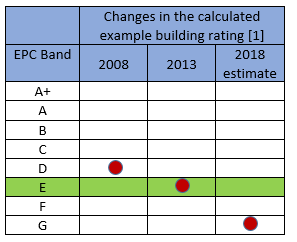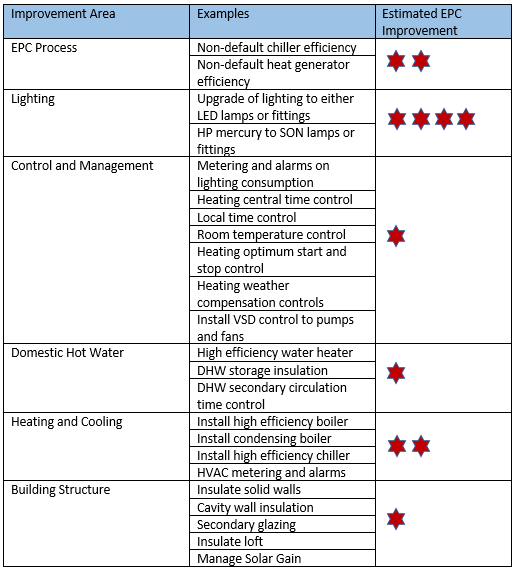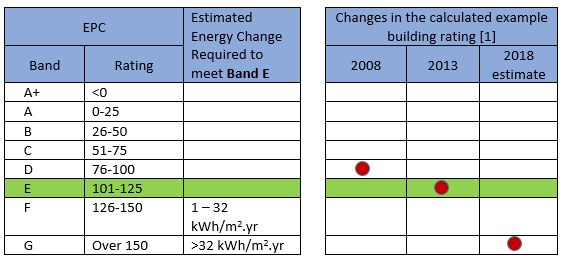Minimum Energy Efficiency Standard deadline looms for lease properties
Written by Lewis Morgan
Posted on September 27, 2017
Landlords in England and Wales have just six months to ensure they comply with energy efficiency regulations for non-domestic properties.
The Minimum Energy Efficiency Standard (MEES), or to give its official title Energy Efficiency (Private Rented Property) (England and Wales) Regulation 2015, applies to all non-domestic leased properties in England and Wales.
It sets out that:
- From 1 April 2018, landlords of non-domestic private rented properties (including public sector landlords) may not grant a tenancy to new or existing tenants if their property has an EPC rating of band F or G as shown on a valid Energy Performance Certificate (EPC) for the property.
- From 1 April 2023, landlords must not continue letting a non-domestic property which is already let if that property has an EPC rating of band F or G.
What this means is that from April 2018, any rented non-domestic property where there is to be a new lease for more than 6 months and less than 99 years, the EPC must have a rating of E or better.
There is no requirement to re-certify if there is an existing valid EPC but after April 2023 no privately rented properties should have a current valid EPC rated F or worse.
However, if the EPC is rated F and expires in 2022 there is no requirement for the landlord to obtain a new EPC until they intend to re-let the property once the current lease expires. At which point the requirements of this regulation will apply.
Penalties
The penalties which could be applied to the landlord if there are found to be non-compliant are
- Less than three months in breach – Up to either £5,000 or 10% of the rateable value to a maximum of £50, 000, whichever is the greater.
- More than three months in breach – Up to either £10,000 or 20% of the rateable value to a maximum of £150, 000, whichever is the greater.
Process
To avoid being in breach of the MEES regulations, SaveMoneyCutCarbon provides a range of services for companies, with a four-step process.
Review existing EPC – If the EPC is rated as an E and will still be valid at the time of the next lease renewal there is no immediate need to address. However, from April 2023 all leased properties with a valid EPC must have a rating of E or better so plan now for the inevitable.
Where the property has an existing EPC which is about to expire and will require renewal if the property is due to be leased, if there have been no energy improvements to the property, there is a significant risk that it will categorised as at least one band worse than the previous assessment. This is due to changes to the reference levels which reflects the implementation, since 2008, of tighter of the energy efficiency standards for buildings.

Note 1 – To reflect the changes in the Building Regulations and increase in the efficiency expected of new and improved buildings, since 2008 there has been a change of approximately 25% in the calculated ratings, i.e. a property in 2008 with a rating of 98 (Band D) would now have a rating of 123 (Band E) and it is expected by the next revision in 2018 this would have increased to 153 (Band G).
Prepare a draft EPC and recommendations assessment – Where the EPC has failed the test and/or due for renewal prior to the renewal of the lease in the next couple of years then action is required.
- Undertake an EPC survey to prepare a draft assessment and identify the current rating.
- Model the impact and benefits of the possible improvements that could implemented.
- Prepare a minimum standards specification for the work required
- Prepare a costed programme of works, identifying implementation costs and the cost, energy and EPC benefits.
The table below sets out the improvement areas that should be considered and the relative impact on the EPC rating.
Implement improvements – Deliver the improvements planned and sign off against the defined minimum specification standard
Issue compliant EPC – Review and lodge the EPC to reflect the improvements implemented
Exemption
There are some exemptions to the scheme which are
- Properties let on a tenancy of less than 6 months and greater than 99 years are excluded.
- The landlord will be eligible for exemption if it can be shown that
- The measures are not cost effective within a seven year payback
- Despite reasonable efforts, the landlord cannot obtain necessary consents to install the required energy efficiency improvements, including from tenants, lenders and superior landlords.
- A relevant suitably qualified expert provides written advice that the measures will reduce a property’s value by 5% or more, or that wall insulation required to improve the property will damage the property.
Improvement Areas
Taking into account of the exemption that improvements with a payback of greater than seven years do not need to be considered there are a limited selection of options available to improve the EPC band, these are summarised below together with their relative impact on the EPC rating:

EPC rating
EPC is a ratio that compares the actual building designed performance to that of an ‘Ideal’ reference building of a similar size, shape and use as that of the actual building. The reference building used in the EPC calculation routine is one built in line with the energy efficient standards defined in the current issue of Part L of the Building Regulations and so does not reflect the age or build standard of the actual building; a rating of 100 indicates that the actual building has a performance similar to the reference standard.
The EPC bands, ratings and estimated change in the building performance to meet the requirements of at least a Band E, and changes in an example buildings rating through the amendments that have occurred in the calculation routine used are illustrated below.

Note 1 – To reflect the changes in the Building Regulations and increase in the efficiency expected of new and improved buildings, since 2008 there has been a change of approximately 25% in the calculated ratings, i.e. a property in 2008 with a rating of 98 (Band D) would now have a rating of 123 (Band E) and it is expected by the next revision in 2018 this would have increased to 153 (Band G).